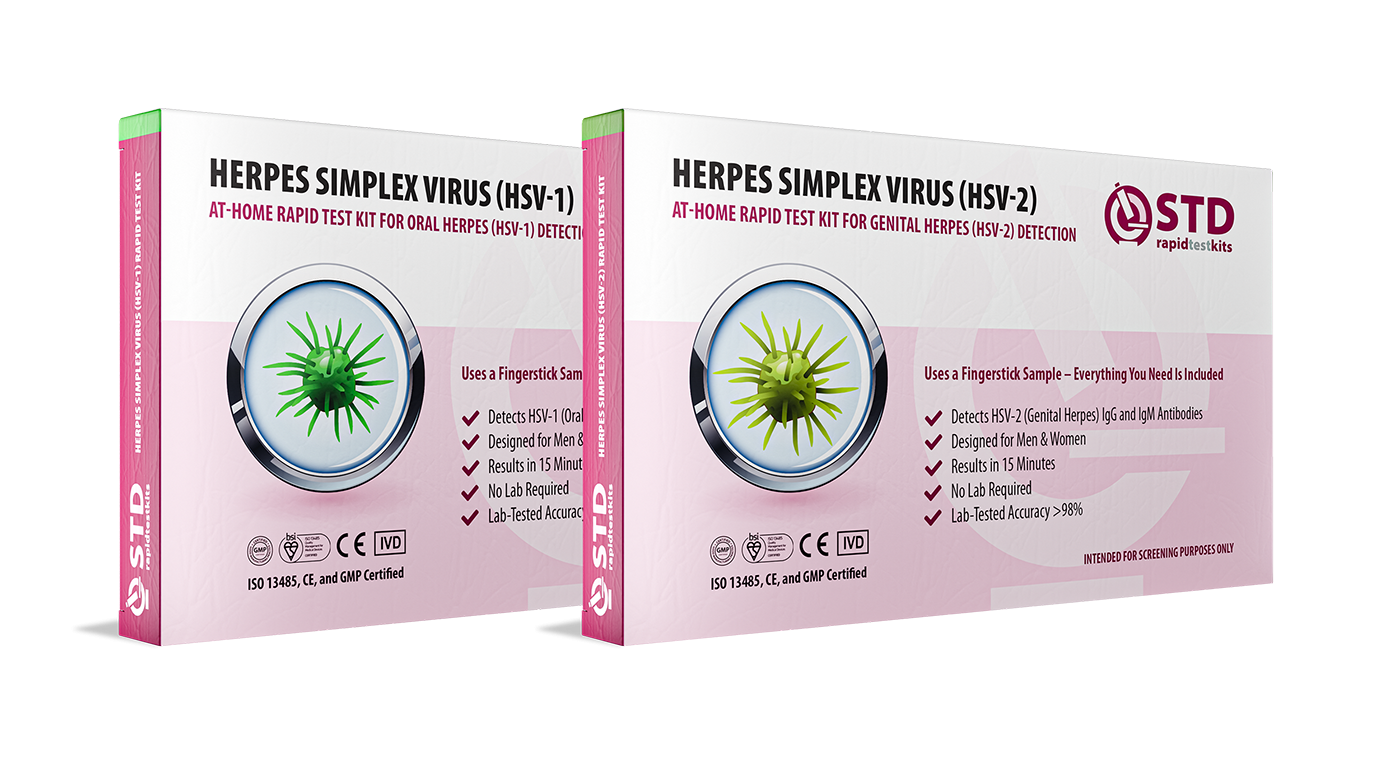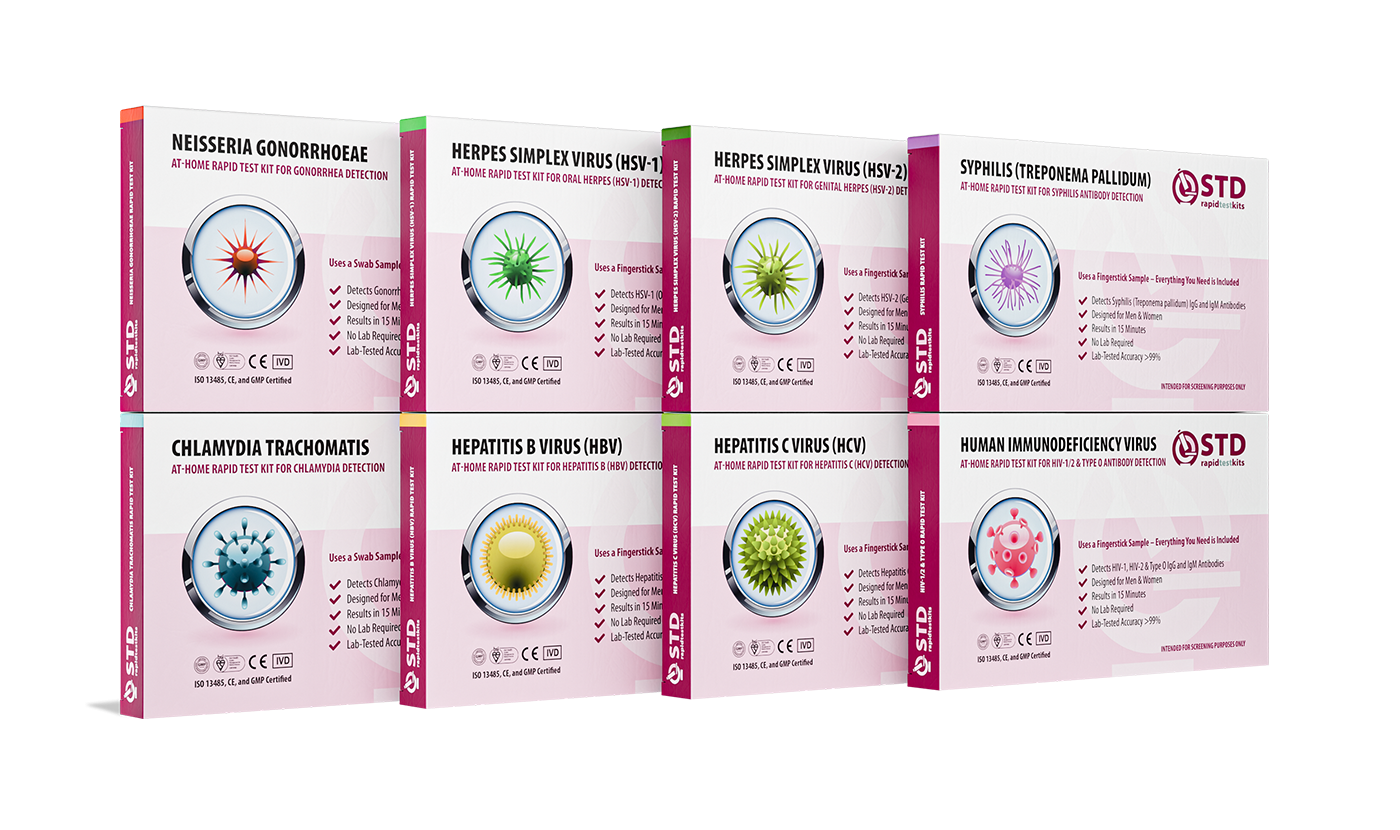Quick Answer: Birth control can worsen Herpes outbreaks in some people by disrupting hormonal balance and weakening immune defenses. Estrogen, progesterone, and stress-linked cortisol may all contribute.
“It Kept Coming Back Right Before My Period”, When Hormones Are the Trigger
Tasha, 27, had been diagnosed with genital herpes for three years. Her outbreaks were rare, until she switched to a hormonal IUD.
"The first month, I thought it was stress. By month three, I knew something was off. Every time my period came, so did the tingling, the ache, and the sore. It was like my hormones were inviting it in."
Many people assigned female at birth notice a predictable rhythm to their Herpes outbreaks. The week before menstruation, estrogen and progesterone levels drop sharply. That dip can weaken mucosal barriers and lower immune activity, allowing the dormant virus to reactivate.
- Estrogen: Helps maintain skin and mucosal immunity
- Progesterone: May suppress antiviral immunity during luteal phase
- Cortisol: Rises during PMS or birth control adjustment, reducing immune defense
In Tasha’s case, her hormonal IUD (like Mirena or Liletta) released steady doses of progestin, altering her body’s natural rhythm and immune baseline. While these devices are effective at preventing pregnancy, their impact on Herpes isn't often discussed in clinical settings.
People are also looking for: Dental Dam vs Condom vs Saran Wrap: What Actually Protects You?
Why Birth Control Messes with Your Immune System
We tend to think of birth control as a reproductive tool, not something that affects your immune health. But synthetic hormones can change how your body responds to infections, including latent viruses like Herpes Simplex Virus (HSV-1 and HSV-2).
Here’s how the science breaks it down:
- Combined oral contraceptives (COCs) can suppress certain immune cells, making it harder to control herpes reactivation.
- Progestin-only methods (like the mini-pill, implant, or IUD) may downregulate natural killer cells that help fight HSV.
- Estrogen dominance or deficiency can alter the integrity of the skin barrier in genital tissue, making it easier for a latent virus to resurface.
A 2002 study in the Journal of Infectious Diseases found that sex hormones directly influence HSV latency and replication. While most people think of “triggers” as stress or sleep, the immune shifts from hormonal contraception can quietly push the virus back into action.
It's not about whether birth control "causes" herpes; it doesn’t. But if you already have HSV, the wrong hormonal fit might stir it up more often.
Birth Control Types Ranked by Risk for Herpes Reactivation
This isn’t a one-size-fits-all situation. Some people experience zero changes in outbreak patterns, while others swear a specific method made everything worse.
Here’s what we know about different contraceptives and their potential impact on Herpes symptoms:
- High-impact (more flare-up reports): Hormonal IUDs (Mirena, Skyla), Nexplanon implant, Depo-Provera shot
- Moderate-impact: Combined oral contraceptives (pills), vaginal ring (NuvaRing)
- Low-impact (less hormone load): Copper IUD (non-hormonal), condoms, diaphragm
Still, clinical studies are limited. Most data comes from patient reports, not large-scale trials. And OB/GYNs may not always connect dots between symptoms and synthetic hormone use.
If you suspect your birth control is triggering outbreaks, trust your body. Track your cycle, symptoms, and any flare-ups for 2–3 months. You can also switch to a non-hormonal method and compare how your body reacts.
You’re not being paranoid, you’re being observant.
This Isn’t Just a Stress Breakout, Here’s What Hormonal Herpes Feels Like
Not all outbreaks are the same. And when hormones are involved, the early symptoms can feel weirdly subtle, until they’re not. For many people, a “hormonal herpes” flare-up is sneakier than the first one they ever had.
Here’s what it often feels like, even before a sore appears:
- Genital tingling: A buzzing, crawling, or prickly sensation in the same spot every time
- Pelvic heaviness: A low, dull ache or inflammation near the genitals or lower back
- Increased discharge: Clear, watery, or white discharge that feels off, but tests negative for yeast or BV
- Mood crash: Irritability, anxiety, or crying spells beyond regular PMS
- Fatigue: Feeling wiped out, flu-ish, or emotionally drained
If this sounds familiar and happens cyclically, it might not be “just hormones”, it might be hormones lowering your body’s defenses against HSV.
One Reddit user put it this way:
“I used to think I was getting a weird yeast infection every time I got my period. Turns out, it was herpes reactivating. No sores, just this electric itching and pain in the same damn spot.”
Note: Herpes doesn’t always show up as visible sores. Internal lesions, nerve inflammation, and vaginal irritation can all be part of a “silent” or prodromal outbreak.
Check Your STD Status in Minutes
Test at Home with RemediumGenital & Oral Herpes Test Kit

 For Men & Women
For Men & Women Results in Minutes
Results in Minutes No Lab Needed
No Lab Needed Private & Discreet
Private & DiscreetOrder Now $75.00 $98.00
For all 2 tests
How to Track Hormonal Herpes Triggers
If your outbreaks feel cyclical, or seem worse since starting hormonal birth control, it’s time to play detective. Start by tracking:
- Period Start/End Dates (Use apps like Clue or Flo)
- Birth Control Use: Pill time, IUD placement date, etc.
- Outbreak Symptoms: Tingling, itching, soreness, mood shifts
- Stress Events: Work burnout, emotional spikes, illness
- Immune Triggers: Lack of sleep, diet changes, alcohol
After 1–3 months, look for patterns. Do flare-ups occur the week before your period? Right after ovulation? Did a change in your pill brand coincide with new symptoms?
Then take your log to your OB/GYN or STI specialist. It’s not overreacting, it’s advocacy. You’re bringing data to a body-mystery. That’s powerful.
What Your Doctor Might Not Tell You (But Should)
Many clinicians don’t warn patients about potential immune effects of hormonal contraception. Herpes isn’t listed on most birth control pamphlets. And because herpes is so stigmatized, it rarely gets airtime in gynecological conversations, especially when patients aren’t actively in an outbreak.
Here’s what’s missing from most visits:
- Herpes is not “curable,” but its patterns can shift with hormonal changes
- Hormonal birth control isn’t one-size-fits-all, especially with chronic viral infections
- Natural family planning or copper IUDs are valid, non-hormonal options that don’t alter immune cycles
- Outbreaks don’t have to include sores to be real, painful, or suppressible
If you have to educate your doctor about this, you’re not alone. Bring studies, symptoms, and trackers. Ask direct questions: “Can we try a hormone-free method to see if that helps my flare-ups?”
Call-to-Action: Test, Track, and Take Back Control
Whether you’re dealing with new symptoms or familiar flare-ups, clarity starts with testing and self-advocacy. If you're not sure what’s causing that monthly irritation, don’t guess, test.
This at-home combo STD test kit checks for Herpes and other common STIs discreetly, quickly, and without judgment.
Don’t wait for answers from someone else. Start getting them from your own data, your own body, and your own test results.
“I Switched My Birth Control, and the Outbreaks Stopped”
Jules, 34, had been on the pill since age 18. But after being diagnosed with genital herpes in her early 30s, her flare-ups became constant.
“I was having an outbreak almost every other month. My doctor said stress. But I wasn’t stressed. I was just... on the pill.”
Jules tracked her symptoms, noting how outbreaks flared mid-cycle, when estrogen surged, and again right before her period. She decided to stop hormonal birth control altogether. Within three months, her flare-ups dropped to once or twice a year.
Not everyone will have this result. But for some, especially those sensitive to hormone fluctuations, ditching synthetic estrogen or progestin can bring relief.
Jules now uses a copper IUD and condoms with a long-term partner. “I still have herpes,” she says, “but I have peace, too.”
People are also looking for: How Hepatitis B Can Spread Without Sex
Solutions That Aren’t Just “Use Lube and Relax”
If your herpes symptoms seem tied to birth control, you have options, and they’re not all scary or drastic. Here are a few routes people take:
- Switch to non-hormonal methods: Copper IUD (Paragard), condoms, diaphragm, or fertility awareness
- Try a lower-dose hormonal option: Not all pills are equal, some contain gentler synthetic hormones
- Supplement immune support: Daily lysine, zinc, vitamin D, and magnesium have been shown to reduce outbreaks in some people
- Consider episodic or daily antivirals: Like valacyclovir, especially during cycle peaks or stressful events
- Log symptoms: Use a simple tracker or notes app to connect dots between birth control, period, and herpes symptoms
And if your doctor dismisses you? That’s a red flag, not a reflection of your reality. Find someone who listens. Planned Parenthood and sexual health clinics are often more herpes-aware than general practice OB/GYNs.
Do You Have to Stop Birth Control If You Have Herpes?
No. Not always. Many people with HSV use hormonal birth control without problems. But if you suspect it’s making things worse, you deserve options, not shame.
Ask yourself:
- Did your herpes symptoms change after starting or switching BC?
- Do you flare at the same time each month?
- Have you ruled out other triggers (sleep, stress, friction, diet)?
If the answer is yes, your hormones may be playing a bigger role than you realized. You don’t have to quit cold turkey. Start with information, support, and maybe one small change, like a different method or timing your antiviral meds around your cycle.
Your body isn’t betraying you. It’s trying to talk to you.
Herpes and Testosterone Therapy: What Trans and Nonbinary Folks Need to Know
If you’re on testosterone (T) therapy and noticing more frequent or intense herpes symptoms, you’re not alone. Hormone replacement therapy can shift your immune baseline in ways that affect latent viral activity, including HSV.
While research on herpes and testosterone is limited, anecdotal reports suggest:
- T can alter mucosal immunity in the genitals, potentially making it easier for herpes to reactivate
- Fatigue and skin changes during early hormone adjustment may also mimic or mask prodromal symptoms
- Stress and dysphoria can amplify symptoms, especially when navigating medical care that lacks trans-competent providers
If you’re worried about your outbreaks while on HRT, track your symptoms, advocate for yourself, and consider a telehealth STI consult. Herpes is a medical condition, not a moral failing, and your gender doesn’t change your right to safe, competent care.
Queer, Chronically Ill, Neurodivergent? You’re Not Imagining It
If you’re part of the queer or chronically ill community, you’re probably used to hearing “It’s all in your head.” That gaslighting can extend to Herpes, especially when symptoms are atypical, internal, or dismissed by clinicians who don’t understand hormonal sensitivity.
Here’s what’s real:
- Lesbians and queer women can and do get herpes, oral, genital, or both
- Neurodivergent people may experience herpes pain more intensely due to sensory sensitivity
- Autoimmune flares can coincide with herpes outbreaks, especially if birth control alters your cytokine balance
You don’t need a visible sore to justify your experience. If it hurts, stings, burns, or feels “off”, that’s valid. And if hormones make it worse, that’s worth naming.
Check Your STD Status in Minutes
Test at Home with Remedium8-in-1 STD Test Kit

 For Men & Women
For Men & Women Results in Minutes
Results in Minutes No Lab Needed
No Lab Needed Private & Discreet
Private & DiscreetOrder Now $149.00 $392.00
For all 8 tests
FAQs
1. Can birth control make herpes worse?
Yes, for some people. Hormonal birth control can change your immune system, making outbreaks happen more often or more severely.
2. What kind of birth control is the worst for herpes?
People often say that hormonal IUDs, the Depo shot, and implants like Nexplanon make herpes symptoms worse. But everyone has a different reaction.
3. Will changing my birth control stop my outbreaks?
It could. Some people say that using a copper IUD instead of hormones helps with flare-ups or stops them completely.
4. Can you safely take antivirals while taking the pill?
Yes, common herpes medicines like acyclovir and valacyclovir don't make birth control less effective.
5. Does estrogen keep herpes from spreading?
Estrogen helps keep your mucosal immunity strong, but sudden drops, like right before your period, can make it weaker.
6. Can testosterone therapy make herpes worse?
Some people on T have more outbreaks, which could be because their mucous membranes change or their immune systems are weakened. More research is needed, though.
7. Should I tell my OB/GYN that I have herpes?
It's a good idea, especially if you're starting or changing birth control. They should know how your body works.
8. What if my doctor doesn't trust me?
Keep track of your symptoms, bring data, and look for a new provider. Planned Parenthood and clinics that focus on STIs often take herpes seriously.
9. Can I check for herpes at home?
Yes. STD Rapid Test Kits sells home herpes tests that are quick, private, and trusted by doctors.
10. Do I have to choose between controlling herpes and using birth control?
No, but you might have to try a few things to find the right one. Your care plan should take into account both of your needs.
You Deserve Answers, Not Assumptions
Herpes isn’t just a skin condition, it’s a virus that responds to your hormones, your stress, your environment. And if your birth control is making it worse, you deserve to know.
Track your symptoms. Trust your gut. Don’t settle for dismissive care. And when in doubt, test
Sources
1. Herpes Symptoms & Timeline – Planned Parenthood
2. First Genital Herpes Outbreak – Verywell Health
3. Symptoms of First Herpes Outbreak – ACOG
4. How Does Herpes Feel? – Healthline
5. Hormonal Contraception & Herpes Shedding – NCBI PMC
6. Menstrual Cycle, Hormonal Contraception & HSV-2 Shedding – PubMed










